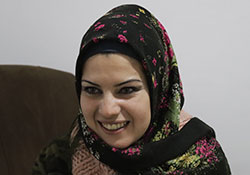Abeer Alhmidi Alkheder, 35 years old, health mediator in Hatay

WHO
“In class, we used to start whistling so we would not hear the bombs’ sounds,” remembers Abeer Alhmidi Alkheder, a Syrian teacher who came to Turkey in 2015. Before that, she worked in a Syrian primary school. “As a teacher, my primary goal was to make my students forget about the war.” She also spent much of her own money buying food and clothing for the children who had lost their families. “My only dream was to live in another country, where I could feel human again,” says Abeer.
But when she, along with her mother and younger siblings, joined her elder brothers in Hatay, a south-eastern city in Turkey, she did not leave her problems behind. Her 12-year-old transgender brother was struggling. “He was not accepted by his family or classmates,” Abeer explains. “He was subjected to violence at school and in the family. Every night, my little brother was having a nervous breakdown and I couldn’t do anything for him.”
At the same time, her 13-year-old sister was suffering from post-traumatic stress disorder from the war. “At night, I prayed to find a solution for my siblings,” says Abeer.
During her first year in Turkey, Abeer started volunteering in a Syrian school. She tried to be a light in the lives of the many traumatized students she met, but her style clashed with the administration. After leaving the school over these differences, she found herself spending her days in the basement, feeling useless and simultaneously under great pressure from her elder brothers.
“I was making plans to kill myself. I had some pills. Every night I dreamed of taking them,” she says. Then, she heard that psychological support was available at Refugee Health Training Centres. “I decided to go there. This was my last hope, but after my first interview, I felt like I was being heard,” says Abeer.
Her siblings also started to receive psychological support. “The staff at the Centre treated us like human beings. They showed us that another life can be possible for us. Now, we feel secure,” she says.
After getting periodic psychological support for a few months, Abeer decided that she wanted to help other refugees with similar problems. She began working in the Hatay Refugee Health Training Centre as a health mediator, helping direct patients to doctors. “I smile at patients all the time. We shared the same fate, we are all refugees.” She plans to use her first paycheck from the Centre to rent a new house for her mother and younger siblings.
“I always tried to teach my students that everyone has a right to desire better things from life,” she says. “Everyone has a right to express him or herself, as they see fit.”



